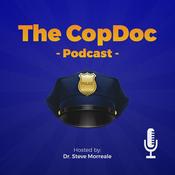The CopDoc Podcast - Season 9 - Episode 164
AI Advocate: Joanne Sweeney on Leadership in the Age of Artificial Intelligence
This week on The CopDoc Podcast, we're back with Joanne Sweeney from Galway, Ireland, reconnecting for our second conversation about one of the most transformative forces in modern organizations: artificial intelligence. She is the host of AI6 Podcast. About AI in six minutes.
What started as curiosity three years ago when Sam Altman introduced ChatGPT has evolved into a mission to help government and public sector leaders understand that AI isn't a threat—it's an enabler of their best work.
Joanne didn't arrive here as a true believer. Like many of us, she was skeptical. Early versions of ChatGPT frustrated her. She walked away. But she came back. And what she discovered changed everything—for her business, her career trajectory, and now for the thousands of leaders she's training worldwide.
Why This Episode Matters Now
We recorded this conversation as 2025 comes to a close, a moment when organizations across policing, government, and the public sector are finally asking serious questions about AI adoption. But many are approaching it wrong—with fear, with uncertainty, with paralysis. Joanne's message is direct: you're out of time for skepticism. The question isn't whether to use AI. It's whether you'll lead the adoption or get left behind.
This isn't about hype. This is about the future of leadership itself.
From Survivor to Pioneer: How Joanne went from teaching communications and marketing for 20 years to becoming one of the most sought-after AI literacy trainers in the public sector. When your entire skill set gets threatened, you have three choices. She made the right one.
The Real Power of Conversational AI: Most people use AI like a search engine—ask a question, get an answer. That's a massive miss. Joanne shares how she thinks with AI, how she uses it to organize her stream of consciousness, how she trains custom assistants that become genuine thought partners. The difference? Productivity multiplies.
The Police Budget Scenario: Steve walks through a practical example every police chief faces: walking out of a meeting empty-handed after requesting resources. Instead of stewing about it, what if you dictated to your AI assistant in the parking lot? "Here's what happened. Here's the pushback. Find me similar agencies that succeeded. What are my counter-arguments for next time?" You'd have answers in minutes.
Why Policy Matters More Than Technology: Here's what surprises Joanne most: three years into the AI revolution, most organizations still don't have policies. Shadow AI is real. People are using these tools without permission, on their own devices, for work. Joanne breaks down what good AI policy actually requires—and it's simpler than most leaders think.
The Agentic Shift Is Here: ChatGPT has agentics. Claude has skills. The technology is moving from tools you command to agents that work independently on your behalf. This happened faster than anyone predicted. Organizations still learning spreadsheet-level AI use have no idea what's coming.
The Nefarious Use No One Wants to Talk About: Steve pushes hard on this. Our voices are out there on podcasts. They can be cloned. Deepfakes are evolving. How will
Hey there! Send us a message. Who else should we be talking to? What topics are important? Use FanMail to connect! Let us know!
Contact us:
[email protected] Website: www.copdocpodcast.com
If you'd like to arrange for facilitated training, or consulting, or talk about steps you might take to improve your leadership and help in your quest for promotion, contact Steve at
[email protected]


